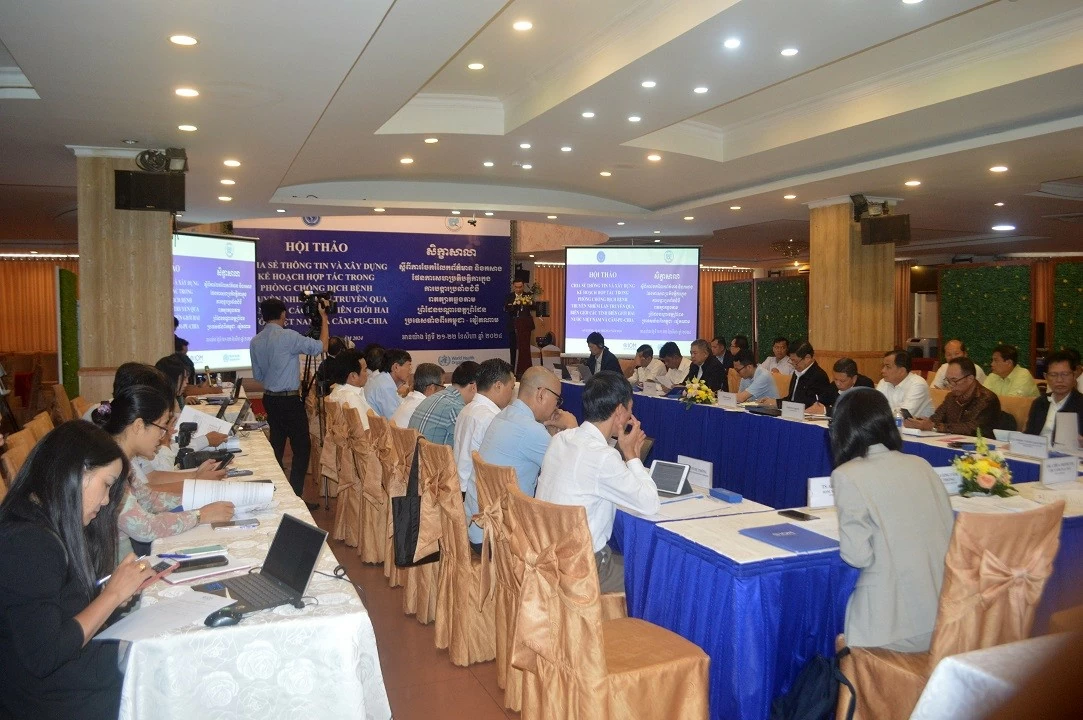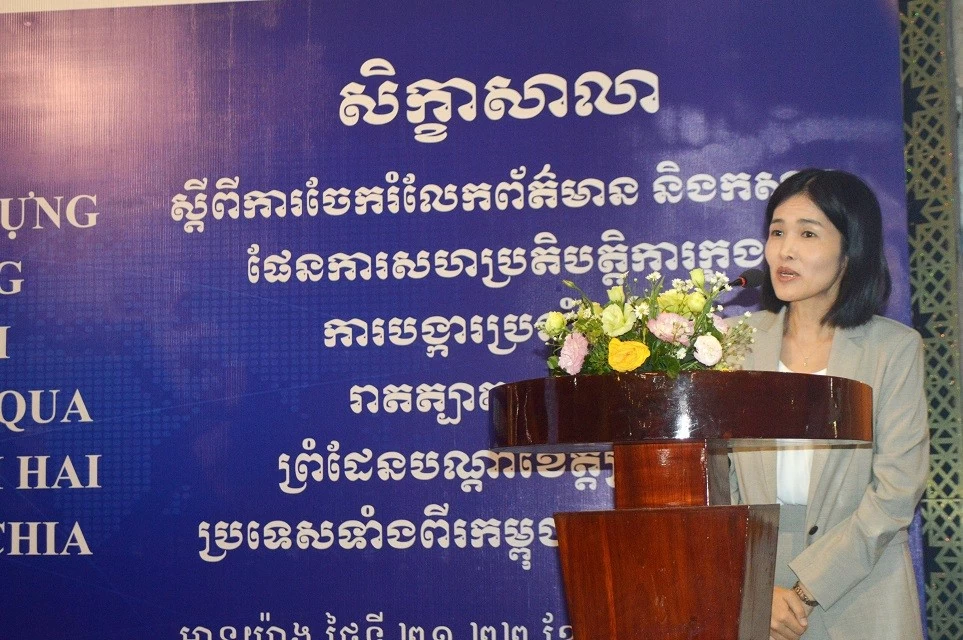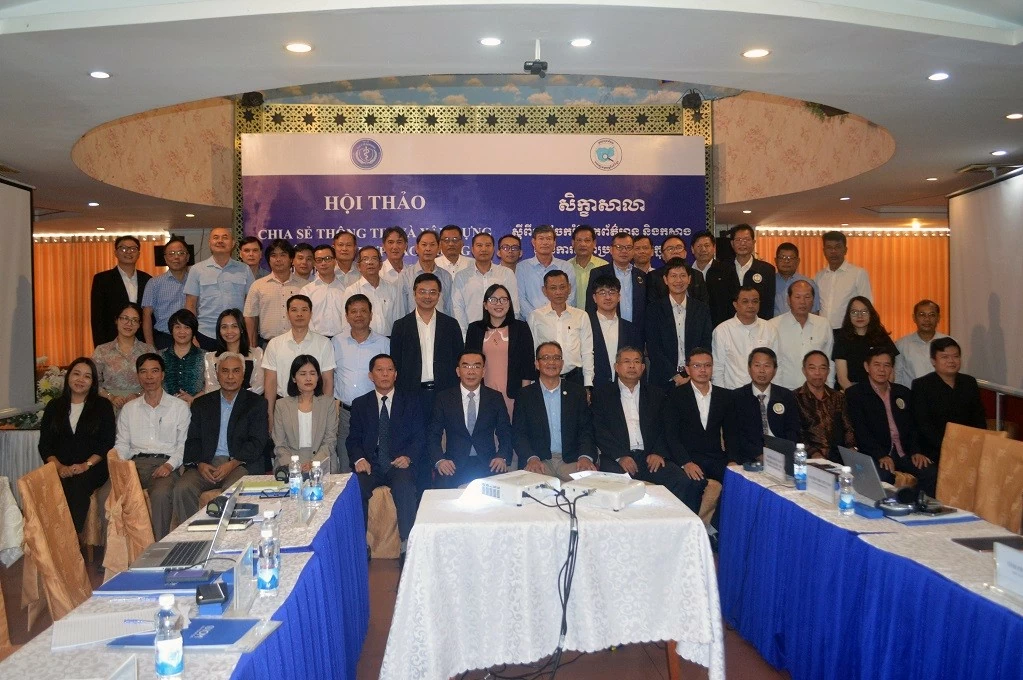
IOM calls for strengthened Vietnam-Cambodia partnership in pandemic preparedness and response
Latest
 |
| Overview the workshop on 'Sharing information and developing a cooperation plan for disease outbreak preparedness and response between Vietnam and Cambodia' was held in An Giang on 22 August. (Source: IOM) |
The General Department of Preventive Medicine, Ministry of Health, in collaboration with the International Organization for Migration (IOM) and the Food and Agriculture Organization of the United Nations (FAO) in Vietnam, held a workshop on “Sharing information and developing a cooperation plan for disease outbreak preparedness and response between Vietnam and Cambodia”.
Over 50 experts and senior officials from the health ministries and eight border provinces of Vietnam and Cambodia participated in the workshop to exchange trends of emerging infectious diseases and strengthen cross-border collaboration on public health security at national and regional levels.
The meeting offered an opportunity for senior experts in human and animal health sectors from both nations to review the implementation of the Border Health Quarantine Agreement, signed between the Governments of Vietnam and Cambodia in 2009.
During the review, the experts identified gaps and needs in existing public health practices at provincial, national and regional levels. Additionally, a dedicated session focused on updated information on emerging diseases, such as A(H5N1) influenza, has provided the experts with best practices and lessons learned from border provinces in enhancing cross-border collaboration and joint interventions.
During the meeting, participants discussed progress on pandemic preparedness and response. They highlighted the unprecedented challenges and new crises, emphasizing the association between human, animal, public health security and the need for multi-sectored approaches. On 14 August, the World Health Organization (WHO) declared the Mpox virus, which is rapidly spreading across several African countries, a “public health emergency of international concern.”
Meanwhile, Vietnam experienced influenza A(H5N1) outbreaks in six provinces, including Long An province, bordering Cambodia, during the first quarter of 2024. In March 2024, Vietnam reported the first human death from H5N1 avian influenza in ten years, followed by the first human infection of bird influenza subtype H9N2 in April 2024. Since early 2024, three Cambodian provinces bordering Vietnam reported nine cases of H5N1 avian influenza, one of which was fatal. The continued spread of infectious diseases across borders calls for increased mobilization of global and regional public health resources to better monitor and respond to these threats.
Responding to the urgent call, the workshop emphasized the need for enhanced collaboration and partnerships to urgently mitigate the effect of transnational public health threats. This requires immediate cooperative action and contingency strategies, particularly at Points of Entry (POE).
 |
| Dr Aiko Kaji, Migration Health Programme Manager at IOM Vietnam. (Source: IOM) |
According to Dr Aiko Kaji, Migration Health Programme Manager at IOM Vietnam, in today's interconnected world, ensuring the health and well-being of all individuals is a collective responsibility that goes beyond national borders. Emerging diseases, such as H5N1 avian influenza and Mpox, have shown that global health security requires collaborative efforts across countries. These diseases pose a significant threat to the international community due to the ease of population movements, the commercial trade and the potential for rapid spread.
"For the first time, human and animal health professionals from Vietnam and Cambodia took part in the bilateral workshop to discuss public health emergency preparedness and response. We encourage the Governments of Vietnam and Cambodia to adopt the One Health approach to implement mobility-sensitive and multi-sectoral public health interventions. Enhancing the One Health capacity at border regions is vital, as these areas are vulnerable to the rapid spread of infectious diseases, including those that can pass from animals to humans. The cross-border movement of people, animals and goods can carry pathogens across regions, making POE crucial for disease surveillance and public health interventions," concluded Dr Kaji.
The joint initiatives between IOM and FAO are paramount for the One Health approach. One Health is a collaborative, multi-sectoral and transdisciplinary approach that aims to optimize the health of people, animals and the environment. It contributes to developing an effective way to tackle health issues at the human, animal and environment interface, including zoonotic diseases.
 |
| During the meeting, participants discussed progress on pandemic preparedness and response. (Source: IOM) |













